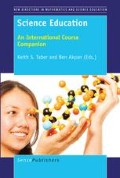Abstract
By all accounts, science and inquiry should go hand in hand. Whether the same is true of science education and inquiry is quite another matter.
Access this chapter
Tax calculation will be finalised at checkout
Purchases are for personal use only
Preview
Unable to display preview. Download preview PDF.
References
Anderson, R. (2002). Reforming science teaching: What research says about inquiry. Journal of Science Teacher Education, 13(1), 1–12.
Armstrong, H. E. (1910). The teaching of scientific method and other papers on education. London: MacMillan. Retrieved from https://archive.org/stream/sciencemethostea00armsuoft#page/n7/mode/2up
Asay, L. D., & Orgill, M. (2009). Analysis of essential features of inquiry found in articles published in the science teacher, 1998–2007. Journal of Science Teacher Education, 21(1), 57–79.
Atkin, J., & Karplus, R. (1962). Discovery of invention. The Science Teacher, 29(5), 45–47.
Ausubel, D., Novak, J., & Hanesian, H. (1978). Educational psychology: A cognitive view (2nd ed.). New York, NY: Holt, Rinehart & Winston.
Banchi, H., & Bell, R. L. (2008). The many levels of inquiry. Science and Children, 46(2), 26–29.
Bell, R. L., Smetana, L., & Binns, I. (2005). Simplifying inquiry instruction. The Science Teacher, 72(7), 30–33.
Brickman, P., Gormally, C., Armstrong, N., & Hallar, B. (2009). Effects of inquiry-based learning on students’ science literacy skills and confidence. International Journal for the Scholarship of Teaching and Learning, 3(2), 1–22.
Bruner, J. S. (1962). A study of thinking. New York, NY: Science Editions, Inc.
Bruner, J. S. (1986). Actual minds, possible worlds. Cambridge, MA: Harvard University Press.
Bruner, J. S. (1990). Acts of meaning. Cambridge, MA: Harvard University Press.
Bybee, R. W. (2002). BSCS 5E instructional model. Colorado Springs, CO: Biological Sciences Curriculum Study.
Bybee, R. W. (2013). Keynote talk entitled Strategies for developing scientific literacy given at the ‘Best Practices in Inquiry-Based Science Education Summer School’ in Crete.
Colburn, A. (2000). An inquiry primer. Science Scope, 23(6), 42–44.
Colburn, A. (2004). Inquiring scientists want to know. Association for Supervision and Curriculum Development, 62(1), 63–66.
Crawford, B. A. (2000). Embracing the essence of inquiry: New roles for science teachers. Journal of Research in Science Teaching, 37(9), 916–937.
Dewey, J. (1910). Science as subject-matter and as method. Science, 31(787), 121–127.
Dewey, J. (1938). Logic: The theory of inquiry. New York, NY: Holt, Rinehart, and Winston.
Dewey, J. (1980). Democracy and education. In J. A. Boydston (Ed.), John Dewey: The middle works, 1899–1924: Vol. 9. 1916 (pp. 1–370). Carbondale, IL: Southern Illinois University Press.
Drayton, B., & Falk, J. (2001). Tell-tale signs of the inquiry-oriented classroom. National Association of Secondary Schools Principals (NASSP) Bulletin, 85(623), 24–34.
Eisenkraft, A. (2003). Expanding the 5E model: A proposed 7E model emphasizes ‘transfer of learning’ and the importance of eliciting prior understanding. The Science Teacher, 70(6), 56–59.
Harlen, W. (2004). Evaluating inquiry-based science developments. Retrieved from http://socrates.usfca. edu/xapedoe/ibl12/page1/page20/assets/wharlen_inquiry_mtg_paper.pdf
Harlen, W. (2013). Assessment & inquiry-based science education: Issues in policy and practice. Trieste, Italy: Global Network of Science Academies (IAP) Science Education Programme (SEP). Retrieved from http://www.interacademies.net/File.aspx?id=21245
Holbrook, J., & Rannikmae, M. (2009). The meaning of scientific literacy. International Journal of Environmental & Science Education, 4(3), 275–288.
Hurd, P. D. (1958). Science literacy: Its meaning for American schools. Educational Leadership, 16(1), 13–16, 52.
Jenkins, E. W. (1979). From Armstrong to Nuffield: Studies in twentieth century science education in England and Wales. London: John Murray.
Kalat, J. W. (2005). Introduction to psychology (7th ed.). Southbank, Vic: Thomson/Wadsworth.
Kyle, W. C. (1980). The distinction between inquiry and scientific inquiry and why high school students should be cognizant of the distinction. Journal of Research in Science Teaching, 17(2), 123–130.
Leonard, W. H., & Penick, J. E. (2009). Is the inquiry real? Working definitions of inquiry in the science classroom. Science Teacher, 76(5), 40–43.
Levy, P., Little, S., McKinney, P., Nibbs, A., & Wood, J. (2011). The Sheffield companion to inquiry-based learning. CILASS, Centre for Inquiry-based Learning in the Arts and Social Sciences, The University of Sheffield, UK.
Llewellyn, D. (2002). Inquire within: Implementing inquiry-based science standards. Thousand Oaks, CA: Corwin Press.
National Research Council. (1996). National science education standards. Washington, DC: National Academy Press.
National Research Council (NRC). (2000). Inquiry and the national science education standards: A guide for teaching and learning. Washington, DC: National Academy Press.
Rutherford, F. J. (1964). The role of inquiry in science teaching. Journal of Research in Science Teaching, 2, 80–84.
Schwab, J. J. (1958). The teaching of science as enquiry. Bulletin of the Atomic Scientists, 14(9), 374–379.
Schwab, J. J. (1962). The teaching of science as enquiry. In J. J. Schwab & P. F. Brandwein (Eds.), The teaching of science (pp. 3–103). Cambridge, MA: Harvard University Press.
Taber, K. S. (2011). Inquiry teaching, constructivist instruction and effective pedagogy. Teacher Development, 15(2), 257–264.
Vygotsky, L. (1962/2012). Thought and language (E. Hanfmann, G. Vakar, & A. Kozulin, Eds., & Trans). Cambridge, MA: The MIT Press.
Vygotsky, L. S. (1978). Mind in society: The development of higher psychological processes (M. Cole, V. John-Steiner, S. Scriber, & E. Souberman, Eds.). Cambridge, MA: Harvard University Press.
Editor information
Editors and Affiliations
Rights and permissions
Copyright information
© 2017 Sense Publishers
About this chapter
Cite this chapter
Riga, F., Winterbottom, M., Harris, E., Newby, L. (2017). Inquiry-Based Science Education. In: Taber, K.S., Akpan, B. (eds) Science Education. New Directions in Mathematics and Science Education. SensePublishers, Rotterdam. https://doi.org/10.1007/978-94-6300-749-8_19
Download citation
DOI: https://doi.org/10.1007/978-94-6300-749-8_19
Publisher Name: SensePublishers, Rotterdam
Online ISBN: 978-94-6300-749-8
eBook Packages: EducationEducation (R0)

